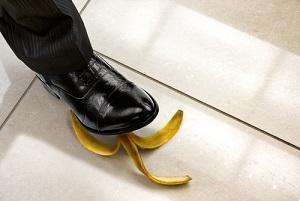Proving Liability in Connecticut Slip and Fall Cases
 When you legally enter onto property owned by another person or entity, the owner of the property assumes a certain level of responsibility for keeping you safe. The degree of responsibility depends on why you are on the property, but unless you are trespassing, you have the right to assume that the property will be reasonably free of hazards that could cause you to slip and fall. Unfortunately, not all property owners are as vigilant as they should be, and thousands of people are injured in slip and fall accidents each year.
When you legally enter onto property owned by another person or entity, the owner of the property assumes a certain level of responsibility for keeping you safe. The degree of responsibility depends on why you are on the property, but unless you are trespassing, you have the right to assume that the property will be reasonably free of hazards that could cause you to slip and fall. Unfortunately, not all property owners are as vigilant as they should be, and thousands of people are injured in slip and fall accidents each year.
Invitees and Licensees
There are two types of visitors that are generally offered protection under Connecticut’s premises liability laws. The first category consists of invitees who, as the name suggests, are on the property by implied or express invitation by the property owner. Perhaps the most common example of an invitee is a customer at a retail store. Invitees are afforded the highest level of responsibility by the property owner.
The second category includes licensees. Licensees enter the property with the owner’s permission but are usually there for their own purposes. A licensee may include a cold-call salesperson or a visitor to a private residence. A property owner must generally keep licensees safe and warn them of hidden dangers but does not necessarily need to take every reasonable precaution to prevent injury.
There is a third category but it consists of trespassers. Adult trespassers are afforded virtually no protection in most cases, but a trespasser may be able to collect compensation in certain situations.
Making Your Case
If you are injured while on someone else’s property, you and your attorney will need to prove four elements in order to collect damages, including:
- The property owner owed you a duty of care, which depends on your status as an invitee, licensee, or trespasser;
- The property owner breached that duty of care, usually through negligence;
- You suffered injuries; and
- The injuries you suffered were caused by the property owner’s breach of the duty of care.
Breaching the duty of care may include a number of behaviors, including failure to address a known hazard, wet floors without a warning sign, and inadequate lighting or security.
A recent case in Connecticut may provide a helpful example. According to reports, a 59-year-old woman from Long Island, NY, recently reached a settlement with the ownership group of a Connecticut Starbucks regarding the woman’s slip and fall accident in 2012. The women reportedly slipped on a piece of cardboard at the entrance of the coffee shop located inside the Mohegan Sun Casino and suffered back, arm, and shoulder injuries. As an invitee on the property, the woman was under the protection of the property owner—who arguably breached that duty of care by not addressing the cardboard on the floor. The two sides avoided trial by reaching a $240,000 settlement in August.
Call Us Today
If you have been injured in a slip and fall accident at a store, public building, or someone else’s home, contact an experienced Connecticut personal injury attorney to discuss your options. Call 860-290-8690 for a free consultation at Woolf & Ross Law Firm, LLC today.






